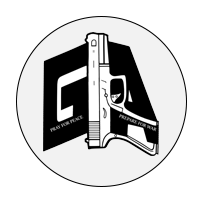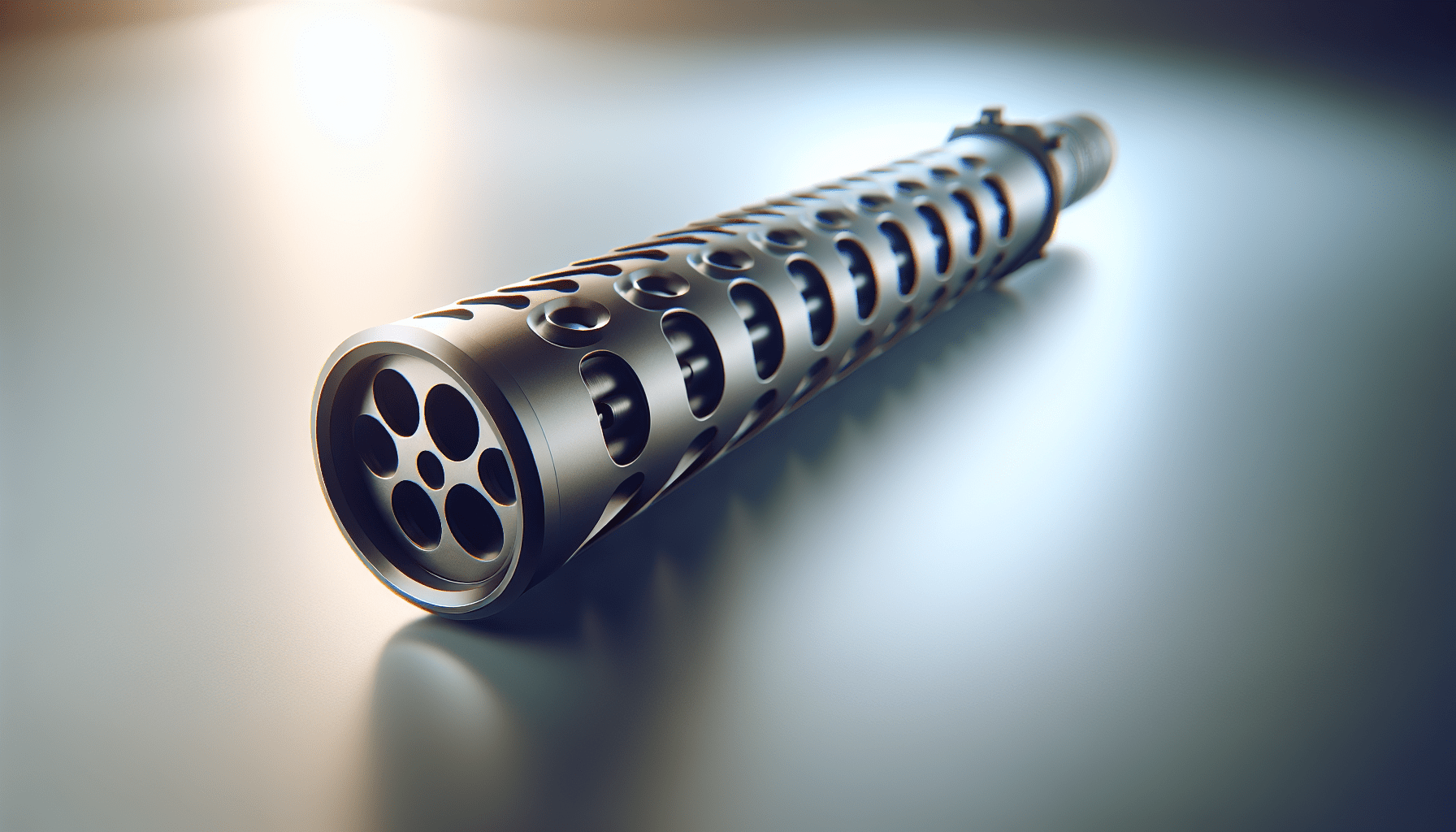Have you ever wondered about the science behind sound suppressors? Despite their portrayal in movies as tools for stealthy villains, sound suppressors, commonly referred to as “silencers,” play a fascinating role in firearm technology and have numerous practical applications. At Green Line Arms, a gun shop and virtual shooting range in Pensacola, Florida, we’re all about promoting responsible gun ownership and providing the best in firearms training and accessories. So, let’s break down the science of sound suppressors for you.
Basics of Sound Suppressors
To understand sound suppressors, it’s essential to know how guns make noise. When you fire a gun, it makes a loud sound due to the explosion of gunpowder, propelling the bullet out of the barrel. This explosion creates rapid gas expansion followed by a sonic boom if the bullet surpasses the speed of sound. A sound suppressor mitigates these noises, but how exactly does it work?
What is a Sound Suppressor?
A sound suppressor is a device attached to or part of the barrel of a firearm that reduces the noise and muzzle flash generated by firing. Contrary to what Hollywood might have you believe, suppressors don’t make guns whisper-quiet. Instead, they reduce the noise level to a more manageable and ear-friendly degree.
Components of a Sound Suppressor
Sound suppressors consist of several components: the outer tube, baffles, and end cap. The outer tube contains everything, while the baffles—internal dividers—trap and slow down the gases produced by firing. The end cap seals the suppressor and can also have a small hole for the bullet to exit.
| Component | Description |
|---|---|
| Outer Tube | Encases all internal parts |
| Baffles | Internal dividers that trap and slow down gases |
| End Cap | Seals the suppressor, with an exit hole for bullet |
Legal Considerations
In the United States, owning a sound suppressor requires going through legal channels, including a background check and paying a federal tax stamp. Regulations vary from state to state, so it’s crucial to be informed before purchasing one.
How Sound Suppressors Work
Knowing the basics is one thing, but understanding how sound suppressors actually reduce noise can get a bit more technical. Let’s break it down step by step.
Trapping and Cooling Gas
When you fire a gun, hot gases expand rapidly out of the barrel. A suppressor captures these gases, allowing them to cool and decelerate. Slowing down these gases reduces the loud “bang” typically heard when a gun is fired.
Splitting the Sound Waves
The series of baffles inside the suppressor splits and redirects the sound waves produced by the firing. Each baffle acts like a mini-wall, dividing the gas particles and making it harder for the sound waves to travel directly outward.
Lowering the Decibel Level
A sound suppressor can significantly lower the gun’s decibel level. An unsuppressed gunshot can reach around 160 decibels, while a suppressed one reduces it to 120-140 decibels. While it may not seem like much, that reduction is quite significant in terms of protecting your hearing and reducing noise pollution.
Reducing Muzzle Flash
Suppressors also help in reducing muzzle flash. This is particularly beneficial for law enforcement and military personnel as it minimizes the shooter’s visibility in low-light conditions, thus maintaining tactical advantage.
| Function | Benefit |
|---|---|
| Trapping Gas | Reduces noise and cools gases |
| Splitting Sound Waves | Makes it harder for sound waves to escape |
| Lowering Decibel Level | Protects hearing, reduces noise pollution |
| Reducing Muzzle Flash | Increases discretion in low-light scenarios |

Different Types of Sound Suppressors
Not all suppressors are built the same. Different suppressors are designed for different types of firearms and purposes. Here’s a look at some common types.
Rimfire Suppressors
Rimfire suppressors are designed for low-caliber, low-pressure rounds like the .22 LR. They’re small, lightweight, and effective at quieting simple, low-power firearms.
Centerfire Pistol Suppressors
These are built to handle higher pressures and larger calibers, typically used in centerfire pistols. They often contain more robust materials and designs to manage the increased forces involved.
Centerfire Rifle Suppressors
Centerfire rifle suppressors are designed for high-pressure, high-velocity cartridges. They are usually larger and more durable, capable of cooling and slowing down gases from powerful rifle rounds.
Specialty Suppressors
These include suppressors custom-made for specific firearms or purposes, such as those used in tactical, military, or law enforcement applications. They can incorporate advanced materials and features to meet unique needs.
Selecting the Right Suppressor
Choosing the right suppressor depends on various factors, including the type of firearm you have, the purpose of the suppressor, and your budget. Here are some points to consider:
Firearm Compatibility
Ensure the suppressor you choose is compatible with your firearm. Not all suppressors work with all guns, so double-check the specifications before purchasing.
Intended Use
Think about how you plan to use the suppressor. Is it for hunting, target shooting, tactical applications, or home defense? Different needs might require different types of suppressors.
Material and Construction
Suppressors are made from various materials, including aluminum, stainless steel, and titanium. Each material has its own advantages and drawbacks in terms of weight, durability, and cost.
Budget
Suppressors can range significantly in price, so it’s essential to consider how much you’re willing to spend. Keep in mind that a higher price often means better quality and features.

Maintenance and Care of Suppressors
Just like any other part of your firearm, suppressors require regular maintenance to function correctly and safely. Neglecting this can lead to performance issues and potentially even damage your weapon.
Cleaning Frequency
How often you clean your suppressor will depend on how frequently you use it. Generally, a light cleaning after every range trip and a thorough cleaning after every few hundred rounds is a good rule of thumb.
Disassembly and Cleaning
Most suppressors can be disassembled for cleaning. Using proper tools and cleaning solutions, carefully remove the baffles and clean each part individually. Always refer to the manufacturer’s guidelines to avoid damaging your suppressor.
Storage
After cleaning, ensure your suppressor is stored in a dry, rust-free environment. Use protective cases or pouches to keep them in pristine condition.
Benefits of Using Sound Suppressors
Using a sound suppressor has several benefits beyond just making gunfire quieter. Here are some reasons to consider adding one to your firearm.
Hearing Protection
One of the most significant benefits of using a suppressor is hearing protection. Even with ear protection, firing a gun can damage hearing over time. A suppressor significantly reduces this risk.
Reduced Recoil
Suppressors can help reduce recoil, making it easier to stay on target and improving your accuracy. This is particularly beneficial for new shooters looking to improve their skills.
Improved Communication
When shooting with others, whether in a range or out in the field, using suppressors can make it easier to communicate without shouting. This can make group shooting activities more enjoyable and safer.
Less Disturbance
For those who enjoy target practice in more populated areas, using a suppressor can help mitigate nuisance to neighbors, making you a more considerate shooter.
| Benefit | Description |
|---|---|
| Hearing Protection | Reduces the risk of hearing damage |
| Reduced Recoil | Improves accuracy and shooting experience |
| Improved Communication | Easier to talk and coordinate during shooting |
| Less Disturbance | Decreases noise complaints from surrounding area |
Myths and Misconceptions
Despite their benefits and increasing popularity, many myths and misconceptions surround sound suppressors. Let’s debunk some of the most common ones.
Myth: Suppressors Make Guns Completely Silent
As mentioned earlier, this is more a product of Hollywood fiction than reality. Suppressors substantially reduce noise, but they do not eliminate it. The sound is more akin to a loud clap than a silenced “pew.”
Myth: Suppressors are Only for Criminals
This myth largely stems from their portrayal in movies and TV shows. In reality, most suppressor owners are law-abiding citizens who use them for hunting, target shooting, and self-defense, and must go through a stringent legal process to own one.
Myth: Suppressors Reduce Bullet Velocity
This is not necessarily true. While adding a suppressor may affect the firearm’s ballistics slightly, it generally does not significantly reduce bullet velocity. Some high-end suppressors can even improve accuracy.
Myth: Suppressors are Illegal
Suppressors are legal in many parts of the United States, though regulated. The process involves background checks and tax stamps, but they are entirely legal and accessible for qualified buyers.
The Future of Sound Suppressors
With advancements in technology, the future of sound suppressors looks promising. Developments in materials science and engineering are paving the way for more effective and efficient suppressors.
New Materials
Innovations in materials like lightweight alloys and advanced composites could make future suppressors more durable and easier to handle, without compromising performance.
Enhanced Designs
The internal design of suppressors is also improving. New configurations of baffles and other internal structures can trap gases more effectively, making future suppressors even quieter.
Regulation Changes
With growing awareness of the benefits of suppressors, there is ongoing debate about easing some of the stringent regulations. Future legislative changes could make it easier for responsible users to acquire them.
Visiting Green Line Arms
If you’re intrigued by sound suppressors and want to learn more or even try one out, consider visiting Green Line Arms at 1350 South Blue Angel Pkwy, Pensacola, Florida. Not only do we offer a range of high-quality firearms and accessories, but our virtual shooting range provides a safe and controlled environment for testing new equipment and honing your skills.
Training Programs
At Green Line Arms, we emphasize responsible gun ownership and offer comprehensive training programs for all levels. Whether you’re a beginner or a seasoned enthusiast, our instructors can provide you with the knowledge and skills to use firearms safely and effectively.
First Responder Tips
We also provide valuable tips and training for first responders, focusing on both firearms and first aid. Our goal is to build a safer community by promoting practical skills and responsible behavior.
Accessories Galore
Looking for firearm accessories? Our shop stocks a wide range of high-quality suppressors, scopes, grips, and more. Our knowledgeable staff can help you find exactly what you need for your weapon.
Final Thoughts
Sound suppressors may have a somewhat mystique aura owing to their cinematic portrayal, but their practical benefits are undeniable. They protect hearing, reduce recoil, improve shooting accuracy, and offer a sensible approach to noise reduction. Whether you’re a first-time buyer or a seasoned shooter looking to expand your collection, understanding the science behind sound suppressors can make your shooting experience better and more enjoyable.
If you’re curious about how a suppressor can fit into your shooting routine, consider visiting Green Line Arms in Pensacola, Florida. With our top-notch products, expert advice, and advanced training programs, we’ll help you make an informed decision that suits your needs. Be it for sporting or tactical use, a sound suppressor can be a valuable addition to your firearm arsenal.
Remember, responsible gun ownership is key to a safer community. So, gear up with the right knowledge and accessories, and happy shooting!




